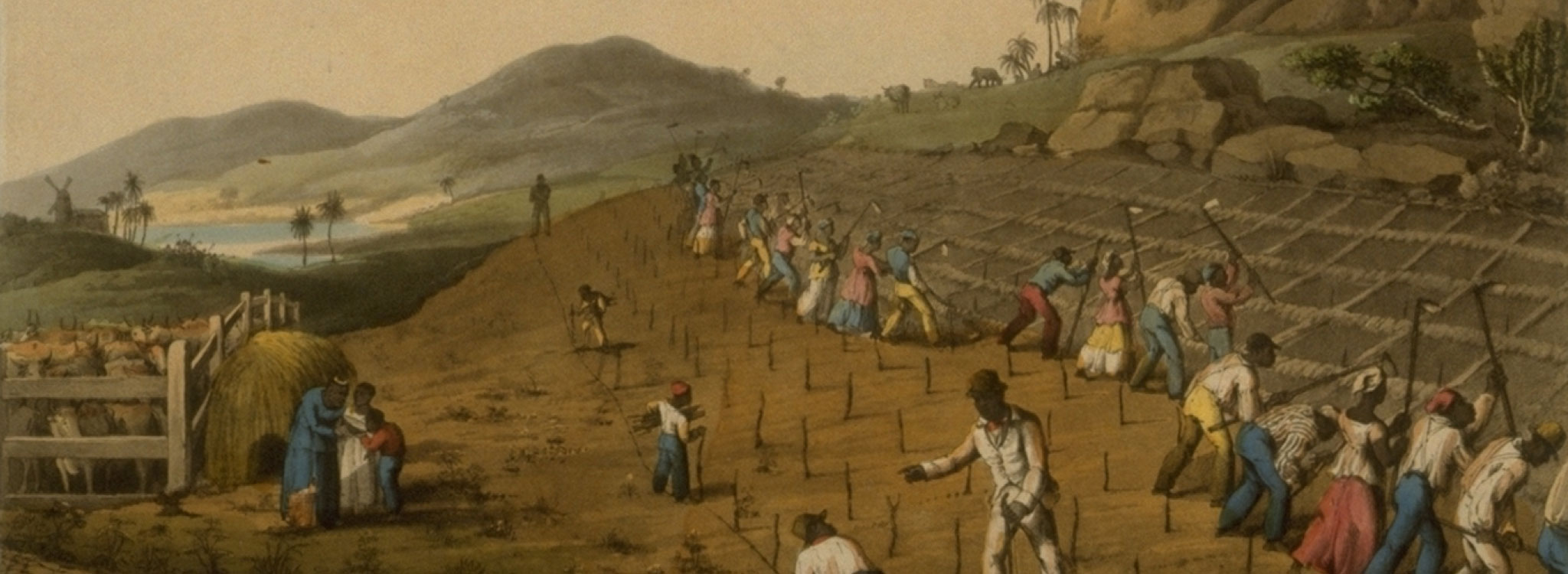Adelina Charuteira (fl. nineteenth century), street vendor and abolitionist was born into slavery in the northern Brazilian city of São Luís do Maranhão in the mid-nineteenth century. During the middle decades of the Brazilian Empire (1822–1889), São Luís was a prosperous port city organized around the export of sugar, tobacco, cacao, and cotton to major trading centers of the Atlantic world. Adelina participated in the region’s long-established tobacco sector by selling cigars (charutos) on the streets of São Luis as an enslaved wage-earner (female: ganhadeira; male: ganhador). The labor she performed peddling cigars earned her the nickname Charuteira (cigar vendor). Adelina was the daughter of an enslaved woman known as Boca da Noite and a wealthy enslaver. Her biological father became impoverished and entered the local cigar trade to make ends meet.
Considering common characteristics of small property owners in Brazilian urban slave societies, it is likely that Adelina’s owner purchased tobacco from a close supplier or was able to grow it on a small plot of land. Adelina was probably the only person that he enslaved. She sewed clothes for additional earnings that diversified the household’s income. Literacy was perhaps a result of Adelina’s proximity to her father, who may have taught her how to read and write—certainly a valued skill in the world of petty commerce and the city’s abolitionist activities after the Law of the Free Womb of 1871.
Enslaved street vendors like Adelina were expected to return earnings to their masters, usually keeping allowed or undeclared portions of the wages earned. This was a fundamental characteristic of Brazilian urban slavery that was also common in many Atlantic port cities where African-descended slaves worked. The ability to earn some money permitted a number of urban slaves to live outside the master’s house and work toward the self-purchase of freedom or the freeing of loved ones. However, it is likely that Adelina lived with her owner and father, connecting cigar making in a small domestic location with the larger expanse of the urban market.
On a daily basis, she sold trays of cigars to snack bars (botequins) in addition to peddling on the street. Peddlers’ relative freedom of movement in Brazilian cities allowed them to interact with spaces of commerce and socialization, such as markets, shops, and distant neighborhoods. By the nineteenth century, slaves who worked on the street often interacted with the growing population of free workers who were also a part of the city’s petty commerce. This exposed ganhadores to freedoms in the public sphere that tended to be absent in the private world of a master’s house or plantation.
It is no surprise then that Adelina became an informant for the city’s abolitionist movement, attending meetings and helping organize runaways from plantations. By the last decades of the nineteenth century, the abolitionist movement had reached the street, and Adelina’s daily vending and literacy skills allowed her to move between the traditional spaces of slave society and those of resistance and organization. She sold cigars to young abolitionists and exchanged information regarding police activity and fugitive slaves. Urban peddlers often became the targets of state discipline and police repression despite their license to move freely throughout the city. Thus Adelina’s abolitionist activities may not have gone unsuspected.
Being a vendor who was female did not necessarily deflect police attention, as evidenced by the habitual police harassment that female, African-descended quitandeiras (produce vendors) experienced in other cities. Still, the number of arrested and detained enslaved vendors who were female was very low in comparison to enslaved males. Some women who were enslaved thus seemingly enjoyed greater freedom of mobility than their male counterpoints, leading a number of vendors and ganhadeiras to participate in networks of urban resistance, such as the cycles of revolts in Salvador da Bahia in the mid-nineteenth century.
Being literate and walking throughout the city peddling charutos provided Adelina with the opportunity to participate in the region’s abolitionist society, the Clube dos Mortos (Society of the Dead). Adelina transformed her vending practice into political action and is today known for her valiant involvement in the abolitionist cause. Like many street vendors of her time, she was both an economic and political agent contending with shifting state disciplinary measures. Political and economic activities merged in her practice of street commerce as she skirted the regular state policing of the urban enslaved and street commerce. Because Adelina’s peddling was common in the urban economy of Atlantic exchange, she was able to move in and out of abolitionist circles rather inconspicuously yet still vulnerable to police surveillance.
Read the full, original biography by Patricia Acerbi in the The Dictionary of Caribbean and Afro-Latin American Biography.Online Resources
"Brazil: Five Centuries of Change." Brown University Libraries | Center for Digital Scholarship, https://library.brown.edu/create/fivecenturiesofchange/chapters/chapter-3/slavery-and-aboliton/.
The Brazilian Report. "Slavery in Brazil." Wilson Center, 13 May 2020 https://www.wilsoncenter.org/blog-post/slavery-brazil
Luz, Francielle, and Jonas Vincentin. "Adelina, a charuteira." Blog GFT Brasil, 25 Nov. 2020, https://blog.gft.com/br/2020/11/25/adelina-a-charuteira/
Bibliography
Gomes, Flávio dos Santos, and Carlos Eugênio Líbano Soares. “‘Dizem as quitandeiras...’: Ocupações e identidades étnicas em una cidade escravista: Rio de Janeiro, século XIX.” Acervo: Revista do Arquivo Nacional, Rio de Janeiro 15, no. 2 (2002): 3–16.
Graham, Sandra Lauderdale. House and Street: The Domestic World of Servants and Masters in Nineteenth-Century Rio de Janeiro. New York: Cambridge University Press, 1988.
Mott, Maria Lucia de Barros. Submissão e resistência: A mulher na luta contra a escravidão. São Paulo: Editora Contexto, 1988.
Moura, Clóvis. Dicionário da escravidão negra no Brasil. São Paulo: Editora da USP, 2004.
Schumaher, Schuma, and Erico Vital. Dicionário mulheres do Brasil: de 1500 até a atualidade: Com 270 ilustrações. Rio de Janeiro: Jorge Zahar Editora, 2000.
Author
Patricia Acerbi
Adapted by
Jennifer Mojica Santana
Contributing Institutions
Hutchins Center for African & African American Research, Harvard University, Cambridge, MA.
Oxford University Press (USA) African American Studies Center





